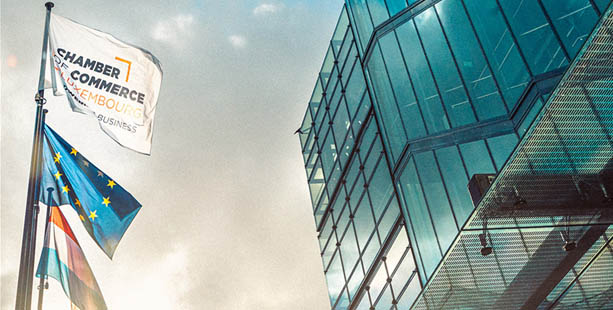
Covid-19

On 18 March 2020, Luxembourg, like many other countries in the world faced with the COVID-19 pandemic, decided to completely lockdown, entailing a generalised shift to teleworking in several sectors, but also making work continuity impossible in other sectors, with some even seeing Government-decreed closures. By mid-May, the country was gradually coming out of the lockdown, but this hardly meant the end of difficulties for many companies and sectors. In mid-October 2020, the socio-economic crisis persists, while the pandemic is likely to continue well beyond 2020.
This is why the Chamber of Commerce is calling for the extension of partial unemployment beyond 31 December 2020 and the mobilisation of the budgetary margin from funds allocated, but not yet used, in favour of companies that were profitable before the crisis and are still heavily affected by it. It calls for an optimisation and extension of the provisions currently in force, in order to cover the fixed costs of the companies most affected by a drop in revenue. In order to achieve this objective, it is of utmost importance to increase the aid allocations per company and to increase them to include an amount to cover their fixed costs.
In order to cushion the economic consequences of the lockdown for companies, the Luxembourg Government has rapidly set up aid schemes that comply with the European framework for State aid and consist of non-refundable direct grants, refundable direct grants, State-guaranteed loans, deferrals of VAT and contributions, etc. The most tangible and widespread aid has been partial unemployment, with a positive impact for both companies and employees. The Chamber of Commerce therefore requests its extension beyond 31 December 2020 for companies and sectors that remain affected by the crisis. Without this extension, the efforts of the last few months, their usefulness and their positive effects on economic recovery would be ineffective.
The economic fabric is still too fragile, the pandemic still too present and demand still too low to allow an abrupt exit from the partial unemployment scheme. Thus, a degressive exit strategy that is targeted and sector-specific is the most appropriate in the current volatile and uncertain situation. The objective of State aid has been, and still is, to maintain employment and prevent the destruction of economic substance and thereby ensure a return to a normal level of activity after the pandemic, while maintaining the capacity for investment, innovation and job creation of companies and their ability to contribute to tax and social security revenues. Without such public support in the short term, in a counter-cyclical policy approach, economic stimulus and fiscal recovery may be weak, delayed, and unsustainable.
The results of the aforementioned aid are mixed. By comparing the allocated aid (repayable and non-refundable aid) published by the Ministry of the Economy with the amounts of aid provided for in the financial statements of the laws concerned, there is a clear difference between the distributed aid (200 million, as of end of July 2020) and budgeted aid (around 540 million, excluding the recovery plan). The same assessment is likely at the end of the year for the ‘Neistart’ recovery programme. Thus, although many companies and the self-employed have benefited from the various aid schemes put in place, which the Chamber of Commerce welcomes, a large number of companies, even though seriously affected by the crisis, obtained no aid for various reasons: eligibility criteria not clear or too strict, procedures too complex and cumbersome, processing times too long, insufficient clarity of existing aid schemes, etc. In addition, the payment deferrals granted are now due and claimed by the administration, while many companies are still in a delicate phase.
Based on these findings, the Chamber of Commerce asks that the budgetary margin from funds allocated but not used, and initially assigned to companies, be effectively mobilised in favour of companies still heavily affected by the crisis. This would not result in any additional burden on public finances as budgetary envelopes already approved but not used would simply be re-channelled into new aid. If, in addition to stabilising and reviving the economy, controlling public finances and indebtedness must indeed be at the heart of the Government's concerns, this crisis requires from the public authorities a countercyclical budgetary policy and therefore effective and targeted support to the most affected economic players. Knowing that it is difficult to limit these to a few specific sectors, such as the Horeca sector, travel agents, the events sector, MICE activities in general or even small local businesses, the aid must primarily target companies who were financially healthy before the crisis, and who are now fully affected by it.
Given the seriousness of the situation for some companies and the urgency to act, the Chamber of Commerce calls for an optimisation and an extension of the provisions currently in force. An optimisation should be understood both in terms of eligibility criteria, as well as in terms of the formalities to be fulfilled and the speed of distribution so that the instrument can be effective. An extension should be understood both in terms of eligible sectors and duration of the benefits and in terms of the amount of aid allocated per employee, including coverage of fixed costs for businesses.
Thus, with regard to specific aid for retail stores, and the recovery and solidarity funds for the Horeca, events, culture and entertainment, and tourism sectors established as part of the ‘Neistart Lëtzebuerg’ package, which covers a period from July 2020 to September 2020 for the former, and from June 2020 to November 2020 for the latter, they offer companies direct monthly aid of EUR 1,000 respectively per employee and per self-employed (full time) in July, EUR 750 per employee in August and EUR 500 per employee in September for the former, and EUR 1,250 per employee and those actively self-employed and EUR 250 per employee on partial unemployment for the latter.
According to the Chamber of Commerce, it is first of all essential to increase the caps per company, as the latter severely limits the potential support. For example, a microenterprise with 9 employees will not be able to receive EUR 1,250 per employee as the total (9 x EUR 1,250, or EUR 11,250) exceeds the upper limit set at EUR 10,000. This abolition of the maximum limit, which is EUR 100,000 per month per large company, should also allow those who meet the criteria to be able to benefit from the maximum amount of aid compatible with the current European framework, set at EUR 800,000.
The deadline for granting aid must also be extended beyond 30 November 2020. In addition, the Chamber of Commerce calls for the assessment of the loss of turnover over several months, like the German or Austrian models, and not only during ‘month N relative to at least N-1’.
Furthermore, it is urgent and important to increase the amounts allocated per employee. Sectors strongly affected by a decrease in demand, and therefore a sharp drop in their activities and turnover, also face a constant level of fixed costs. These fixed expenses (rent, depreciation, leasing costs, energy, etc.) must be paid even in the absence of activity and most seriously affect businesses with a lack of activity. At the same time, these companies receive relatively little aid given that most employees currently must remain on partial unemployment due to lack of activity. The Chamber of Commerce therefore estimates that to remedy this problem, the amounts of EUR 1,250 and especially that of EUR 250 must be increased, so that this additional aid covers a large part of the fixed costs. This could be done by a progressive grid that will take into account the real loss of turnover compared to the pre-crisis level.
Austria and Germany have introduced a relatively extensive fixed cost coverage scheme (‘Fixkostenzuschuss’, FKZ). This scheme, whose budgetary cost is estimated in Austria at EUR 15 billion, has several merits according to the Chamber of Commerce: it contributes to the survival of profitable companies, and can be qualified as a reasonable budgetary cost given that it does not cover companies in difficulty before 31 December 2019. It is a simple and fast model, which concerns all companies whose turnover has fallen by more than 30%. The costs that the State would have to bear as a result of businesses closing, in particular in connection with unemployment benefits, could therefore be much heavier financially. The optimisation and extension of the current recovery plan as proposed by the Chamber of Commerce could constitute a pragmatic alternative to the Austrian model without an in-depth adaptation of the current aid scheme. Funding could be provided by the recovery and solidarity plan budget not yet used.
The Chamber of Commerce is aware that these extensions will require notification to the European Commission and that the latter will have to validate compliance with the criteria for granting state aid. This said, the European Commission is currently in the process of consulting Member States and considering an extension of the COVID-19 aid scheme beyond 31 December 2020, and a model for including fixed costs in the temporary framework, like the Austrian model.
The Chamber of Commerce remains confident in the ability of companies to overcome the difficulties that have arisen in this continuing crisis. The public authorities must remain proactive to quickly put in place the most appropriate aid measures, while establishing a supportive and competitive framework promoting economic recovery and budgetary consolidation in the medium term. The 2021 state budget, which will be tabled on 14 October, must support such an approach. In this context, the Chamber of Commerce refers to its recovery recommendations, presented in the Actualité & Tendances n°25 [1] publication and organised around 5 major levers of action: structural framework, public investment, research, development and innovation (RDI), talent, and taxation. These proposals continue to be relevant in the current situation.

